Related Research Articles
Progressive education, or educational progressivism, is a pedagogical movement that began in the late 19th century and has persisted in various forms to the present. In Europe, progressive education took the form of the New Education Movement. The term progressive was engaged to distinguish this education from the traditional curricula of the 19th century, which was rooted in classical preparation for the early-industrial university and strongly differentiated by social class. By contrast, progressive education finds its roots in modern, post-industrial experience. Most progressive education programs have these qualities in common:
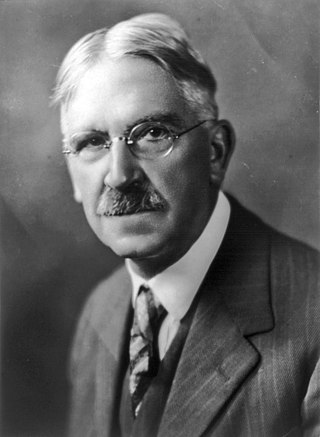
John Dewey was an American philosopher, psychologist, and educational reformer. He was one of the most prominent American scholars in the first half of the twentieth century.

The philosophy of education is the branch of applied philosophy that investigates the nature of education as well as its aims and problems. It includes the examination of educational theories, the presuppositions present in them, and the arguments for and against them. It is an interdisciplinary field that draws inspiration from various disciplines both within and outside philosophy, like ethics, political philosophy, psychology, and sociology. These connections are also reflected in the significant and wide-ranging influence the philosophy of education has had on other disciplines. Many of its theories focus specifically on education in schools but it also encompasses other forms of education. Its theories are often divided into descriptive and normative theories. Descriptive theories provide a value-neutral account of what education is and how to understand its fundamental concepts, in contrast to normative theories, which investigate how education should be practiced or what is the right form of education.
Alternative education encompasses many pedagogical approaches differing from mainstream pedagogy. Such alternative learning environments may be found within state, charter, and independent schools as well as home-based learning environments. Many educational alternatives emphasize small class sizes, close relationships between students and teachers and a sense of community.

A preschool, also known as nursery school, pre-primary school, play school or creche, is an educational establishment or learning space offering early childhood education to children before they begin compulsory education at primary school. It may be publicly or privately operated, and may be subsidized from public funds.
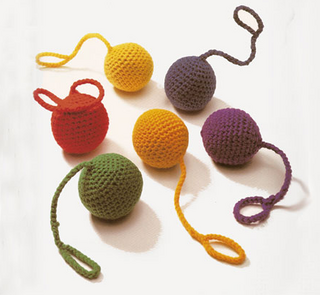
Early childhood education (ECE), also known as nursery education, is a branch of education theory that relates to the teaching of children from birth up to the age of eight. Traditionally, this is up to the equivalent of third grade. ECE is described as an important period in child development.
The Reggio Emilia approach is an educational philosophy and pedagogy focused on preschool and primary education. This approach is a student-centered and constructivist self-guided curriculum that uses self-directed, experiential learning in relationship-driven environments. The programme is based on the principles of respect, responsibility and community through exploration, discovery and play.

Experiential education is a philosophy of education that describes the process that occurs between a teacher and student that infuses direct experience with the learning environment and content. The term is not interchangeable with experiential learning; however experiential learning is a sub-field and operates under the methodologies of experiential education. The Association for Experiential Education regards experiential education as "a philosophy that informs many methodologies in which educators purposefully engage with learners in direct experience and focused reflection in order to increase knowledge, develop skills, clarify values, and develop people's capacity to contribute to their communities". Experiential education is the term for the philosophy and educational progressivism is the movement which it informed. The Journal of Experiential Education publishes peer-reviewed empirical and theoretical academic research within the field.

Music education is a field of practice in which educators are trained for careers as elementary or secondary music teachers, school or music conservatory ensemble directors. Music education is also a research area in which scholars do original research on ways of teaching and learning music. Music education scholars publish their findings in peer-reviewed journals, and teach undergraduate and graduate education students at university education or music schools, who are training to become music teachers.

The University of Chicago Laboratory Schools is a private, co-educational day Pre-K and K-12 school in Chicago, Illinois. It is affiliated with the University of Chicago. Almost half of the students have a parent who is on the faculty or staff of the university.
The National Association for the Education of Young Children (NAEYC) is a large nonprofit association in the United States representing early childhood education teachers, para-educators, center directors, trainers, college educators, families of young children, policy makers, and advocates. NAEYC is focused on improving the well-being of young children, with particular emphasis on the quality of educational and developmental services for children from birth through age 8.
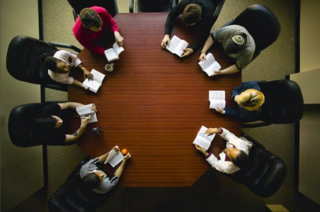
Democratic education is a type of formal education that is organized democratically, so that students can manage their own learning and participate in the governance of their school. Democratic education is often specifically emancipatory, with the students' voices being equal to the teacher's.
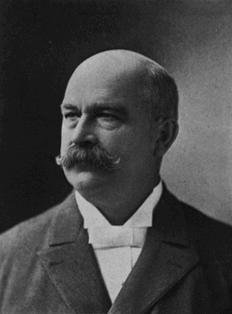
Francis Wayland Parker was a pioneer of the progressive school movement in the United States. He believed that education should include the complete development of an individual — mental, physical, and moral. John Dewey called him the "father of progressive education." He worked to create curriculum that centered on the whole child and a strong language background. He was against standardization, isolated drill and rote learning. He helped to show that education was not just about cramming information into students' minds, but about teaching students to think for themselves and become independent people.
Social learning is learning that takes place at a wider scale than individual or group learning, up to a societal scale, through social interaction between peers. It may or may not lead to a change in attitudes and behaviour.
Music Together is a musical education program for children aged newborn through second grade. First offered to the public in 1987, the program is now offered in over 3000 communities in the United States, as well as over 40 other countries around the world. This expansion has been accomplished through independent centers which are licensed to use the program. All teachers must attend and pass a Music Together teacher training.

Simply Music is a music education organization licensing teachers at over 700 locations in twelve countries and serving an online self-study student community in 128 countries. Australian music educator Neil Moore founded it on the core belief that all humans are naturally musical. Simply Music offers programs for students from birth through old age, with the stated goal that "students acquire and retain music as a lifelong companion." Simply Music patterns its approach after primary language acquisition, where speaking comes first. In this it shares some philosophical ground with other developmental approaches like Kodály, Orff Schulwerk, and the Suzuki Method.
Sara Delano Wilford was a psychologist who taught at Sarah Lawrence College from 1982 to 2014.
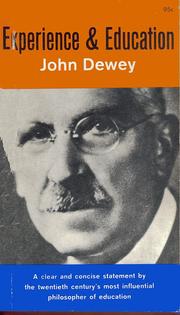
Experience and Education is a short book written in 1938 by John Dewey, a pre-eminent educational theorist of the 20th century. It provides a concise and powerful analysis of education. In this and his other writings on education, Dewey continually emphasizes experience, experiment, purposeful learning, freedom, and other concepts of progressive education. Dewey argues that the quality of an educational experience is critical and stresses the importance of the social and interactive processes of learning.
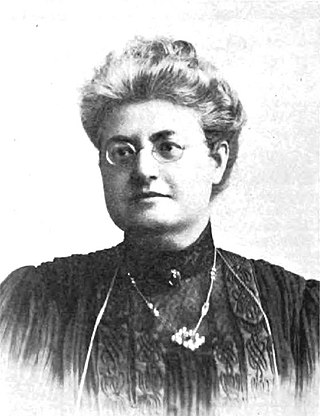
Eleanor Sophia Smith was an American composer and music educator. She was one of the founders of Chicago's Hull House Music School, and headed its music department from 1893 to 1936.

Educational management refers to the administration of the education system in which a group combines human and material resources to supervise, plan, strategise, and implement structures to execute an education system. Education is the equipping of knowledge, skills, values, beliefs, habits, and attitudes with learning experiences. The education system is an ecosystem of professionals in educational institutions, such as government ministries, unions, statutory boards, agencies, and schools. The education system consists of political heads, principals, teaching staff, non-teaching staff, administrative personnel and other educational professionals working together to enrich and enhance. At all levels of the educational ecosystem, management is required; management involves the planning, organising, implementation, review, evaluation, and integration of an institution.
References
- ↑ Terracciano, G. (2011). A Hands-On Music Education In-Service Program for Early Childhood Educators: A Quasi-Experimental Study. (Doctoral Dissertation). Available from ProQuest Dissertations and Theses database.
- ↑ de l’Etoile, S. (2001). "An In-Service Training Program in Music for Child-Care Personnel Working with Infants and Toddlers". Journal of Research in Music Education.
- ↑ Nicholas, B. L. (1993). The influence of an inservice music education program on young Children's responses to music (Doctoral Dissertation).
- ↑ Rogers, L.; Hallam, S.; Creech, A.; Preti, C. (2008). "Learning about what constitutes effective training from a pilot programme to improve music education in primary schools" (PDF). Music Education Research. 10 (4): 485–497. doi:10.1080/14613800802547748. S2CID 145380369.
- ↑ Saunders, T.; Baker, D. S. (1991). "In-Service Classroom Teachers' Perceptions of Useful Music Skills and Understandings". Journal of Research in Music Education. 39 (3): 248–261. doi:10.2307/3344724. JSTOR 3344724. S2CID 143871025.
- ↑ Dewey, J. (1898). The school and society. The University of Chicago Press, Chicago, IL.
- ↑ Gardner, H. (1993). Frames of mind: The theory of multiple intelligences . New York: Basic Books. ISBN 9780465025107.
- ↑ Collins, K.; Griess, K. J.; Carither, K.; Castillo, D. M. (2011). "It's all in the game: Designing and playing board games to foster communication and social skill". YC Young Children.
- ↑ Moomaw, S.; Davis, J. A. (2010). "STEM comes to preschool". YC Young Children: 12–18.
- ↑ Hannaford, C. (1995). Why learning is not all in your head. Atlanta, Georgia: Great Ocean Publisher.
- ↑ Gordon, E. (2000). Rhythm: Contrasting the implications of audiation and notation. Chicago: GIA Publication, Inc.
- ↑ Kemple, K. M., Batey, J. J. & Hartle, L. C. Music play: Creating centers for musical play and exploration. YC Young Children, 59(4).
- ↑ Piaget, J. (1950). The psychology of intelligence. London: Routledge & Kegar Paul.
- ↑ McDonald, D. Music in our lives. National Association of the Education of Young Children. Washington, DC.
- ↑ Hughes, F. (2003). Sensitivity to the social and cultural contexts of the play of young children. New York: Teachers College Press.
- ↑ Morin, F. (2001). "Cultivating music play: The need for changed teaching practice". General Music Today. 2. 14: 24. doi: 10.1177/104837130101400204 . S2CID 141669731.
- ↑ Monroe, W. (1900). Comenius and the beginning of educational reform. New York: Scribner’s.
- ↑ Rousseau, J. (1928). Rousseau on education. London: Edward Arnold.
- ↑ McDonald, D. (1983). "Montessori music for young children". Young Children. 1. 39: 58–63.
- ↑ Brosterman, N. (1997). Brosterman, N. Inventing kindergarten. New York: Abrams. New York.
{{cite book}}: CS1 maint: location missing publisher (link) - ↑ Abeles, H. (1994). Foundations of music education. New York: Schirmer Books.
- ↑ Greata, J. (2006). An introduction to music in early childhood education. New York.: Thomson Delmar Learning.
- ↑ Dewey, J. (1898). The school and society. Chicago, IL: The University of Chicago Press.
- ↑ Seefeldt, C. (1995). "Art-serious work". Young Children. 3. 50: 39–45.